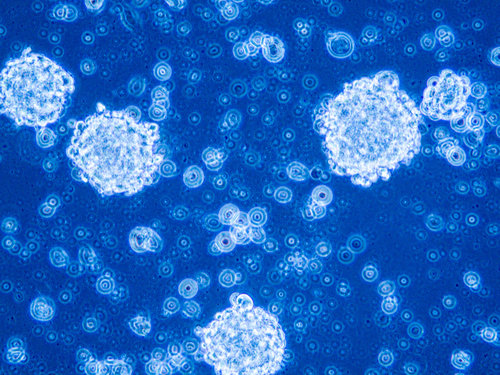Aggressive brain tumors carry potential treatment target for engineered immune cells
Cancer Research UK News Mar 03, 2018

A molecule on glioblastoma cells that could be used as a target for genetically engineered immune cells has been identified.
Researchers at the University of North Carolina found a molecule called CSPG4 in two-thirds of tumor samples from 46 patients with glioblastoma.
Dr. Martin Pule, a Cancer Research UK-funded immunotherapy expert, said finding CSPG4 on the majority of glioblastoma cells suggests it could be tested as a possible treatment target for a broad range of patients.
Immune cells genetically engineered to seek out CSPG4 controlled the growth of glioblastoma cells grown in the lab and in mice. The findings are published in Science Translational Medicine.
“This study confirms that a molecule found on glioblastoma cells could be used as a target for engineered immune cells called CAR T cells,” said Pule.
“It adds to a growing list of possible targets for this type of treatment.”
What are CAR T cells?
CAR T cell therapy is when scientists engineer a patient’s own immune cells to fight cancer.
Specialized immune cells, called T cells, are good at fighting infection, but sometimes find it hard to know if a cell is a cancer cell.
That’s why scientists need to find molecules on cancer cells that can flag to the immune system that they need to be destroyed. CAR T cells can be genetically engineered to hunt out these molecules.
What is glioblastoma?
There are over 130 different types of tumor that can grow in the brain and other parts of the central nervous system. Glioblastoma is the most common type of brain tumor in the UK. It’s also one of the hardest to treat.
Dr. Gianpietro Dotti, who led the latest study, said glioblastoma has a very low chance of being cured with current available therapies. "This is a potential new way to treat these tumors using the immune system."
Importantly, the CSPG4 molecule was also found on specialized tumor stem cells, which experts think are responsible for these aggressive tumors coming back after treatment.
Dotti said: “We know it's very important to target these cells as well because they are probably the cause of tumor recurrence. If you don't target them, they will come back."
Pule added that more work is needed to know for certain that CSPG4 is not found on normal brain cells as well. If the engineered immune cells also attacked healthy cells, this could cause side effects.
"Before the team can test this new target out in a clinical trial, they need to do further work on the safety of the approach and make sure the molecule isn’t also present on healthy cells," he said.
-
Exclusive Write-ups & Webinars by KOLs
-
Daily Quiz by specialty
-
Paid Market Research Surveys
-
Case discussions, News & Journals' summaries